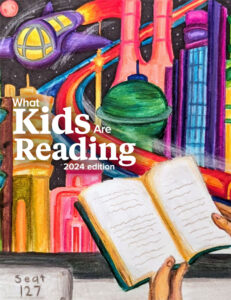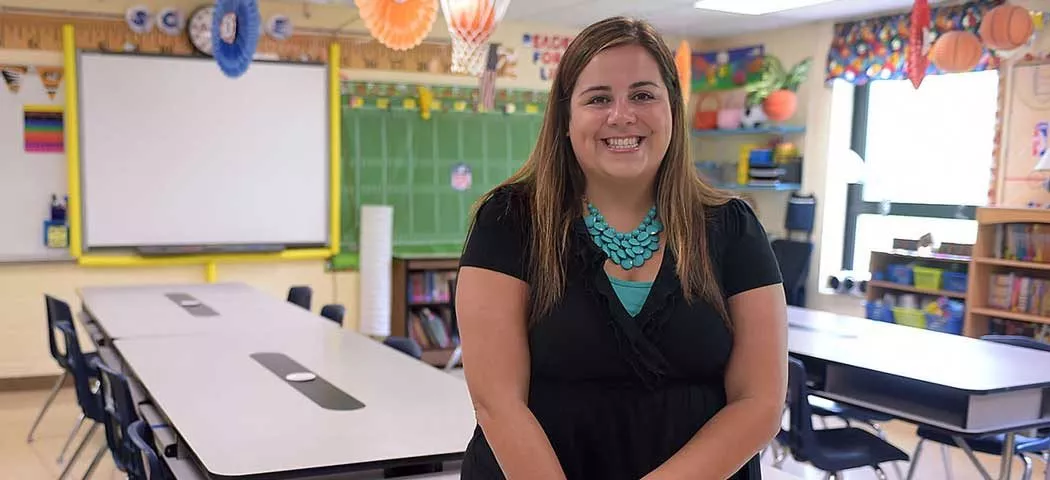
Savannah R-III School District
Savannah, MO
Minnie Cline Elementary School is located in Savannah, Missouri, and is home to more than 500 K–5 students.
She seemed destined to be just another statistic, on a path to increasingly destructive behavior born of a troubled home life, poverty, abuse, and neglect. But along the way, one caring church family and a devoted elementary art teacher stepped in and changed everything. Seeing the potential behind the little girl’s anger and arguments, these compassionate adults reached out, pulling her back from the edge to live a life filled with contributions and near-storybook success.
In 2016, Darbie Valenti was named Missouri State Teacher of the Year, representing Missouri’s 70,689 teachers and joining a select group of just 45 individuals awarded the honor since 1957. Today Valenti teaches fifth-grade science and mathematics at Minnie Cline Elementary in Savannah, Missouri. Not surprisingly, she’s committed to paying it forward, affording each of her students the same kind of ‘hand up’ that made the difference in her own life. Renaissance® solutions provide support for the unique needs and strengths of every student. “My mission is to find and showcase the greatness in every student,” says Valenti. “Using Renaissance technology allows me to more efficiently assess skill levels, then set meaningful goals that both challenge and encourage every learner, from the at-risk student to the high achiever. Renaissance data helps me quickly determine who needs attention and how best to help.”
The challenge
Individualize goals and instruction
Renaissance solutions have been in Valenti’s teaching toolkit for 14 of the 15 years she’s been an educator. The one year without, at a school that had not yet implemented Renaissance technology? “Difficult,” says Valenti. “Without good data, measuring comprehension means time-consuming trial and error. At that point, we relied on book reports to assess reading skills. Some students would fill out reports without actually reading the books, and some parents couldn’t resist the temptation to ‘help.’
“Traditional programs don’t facilitate individualized goal-setting. Basal readers, for example, require the entire class to work on the exact same skill at the same time, regardless of individual student proficiency. In my experience, reliance on those programs means primarily reaching students in the middle of the performance curve—and missing both struggling and advanced learners. Teachers need faster, more reliable methods to be able to develop appropriate instruction and practice activities.”
The results
The results: Growth, obsessive readers, camaraderie
Success for every bunny—and moose and owl and…
Today, K–5 teachers across Minnie Cline Elementary use Renaissance Star Reading® for quarterly benchmark assessments. This solution and the Renaissance Accelerated Reader® learning program have been adopted across all four Savannah R-III district elementary schools, as well as at Savannah Middle School.
Star assessments allow educators to more readily identify students struggling with particular skills, enabling targeted assignment of reinforcement tasks. Teachers also utilize Star analytics data in conjunction with tools from Compass Learning to personalize learning paths.
With a nod to George Reavis’s The Animal School, Valenti says that while not everyone can be an excellent swimmer—just ask a rabbit—we each have valuable skills to contribute. “My students understand that just like you can’t judge all animals on how well they swim, you can’t expect every student to be great at every subject—but everyone can improve and grow.
“One of the real benefits of using the Renaissance solutions is that we can set realistic, individualized goals that promote growth, regardless of the starting point. Goal-setting conversations are private to help emphasize achievement, not total points. In my homeroom, for example, we’ve decorated the wall with a large football field. As students achieve their goals, they move their footballs further down the field toward the goal posts. Two students can reach the 50-yard line together, even though one student’s quarterly point goal might be 40 points and another’s only 10.”
One of the real benefits of using the Renaissance solutions is that we can set realistic, individualized goals that promote growth, regardless of the starting point.
Darbie Valenti, Teacher – Minnie Cline Elementary School
We love to read
“Renaissance programs provide a wealth of usable data to help teachers better understand student performance—including anomalies,” continues Valenti. “Just recently, for example, I observed that one of my students consistently scored lower on reading tests than I’d expect from classroom performance. We tracked progress on his Accelerated Reader Student Record Report, ultimately determining that the problem stemmed from test anxiety, not comprehension difficulties. Using Renaissance, we’re never tied to a single output, but rather can access a variety of analytical data to challenge every student to achieve at full potential.
Renaissance programs provide a wealth of usable data to help teachers better understand student performance—including anomalies.
Darbie Valenti, Teacher – Minnie Cline Elementary School
“The feedback that Renaissance technology provides is immediate and at the fingertips of both teachers and students. That’s particularly critical in giving students ownership of their learning. Accelerated Reader also eliminates duplicity—if students don’t actually read the books, they won’t do well on the quizzes. And accuracy matters. We recognize students not only for achieving point goals, but for maintaining 85 percent or higher accuracy.”
Valenti says Renaissance solutions improve classroom management. “This program truly fosters a love of reading—we see our students voluntarily pick up their books at every opportunity. They’re self-motivated, challenged to earn points, and celebrated in their successes. As a result, students are more likely to stay on task, avoid behavior problems, and continue to develop the reading skills that will serve them well for the rest of their lives.”
And we’re all in this together
Valenti suggests that the Renaissance-based programs give more students more opportunity to shine. “Every Monday morning we announce the names of students who have achieved their goals. The clubs foster a little friendly competition but also spotlight the achievements of students who might be painfully shy, socially awkward, or less adept at sports. I also coach a math team that has earned recognition at both regional and state levels. It’s rewarding to see the pride students take in each other’s accomplishments. Collective success brings a new level of unity to our classrooms.”
After a record 56 detentions and 24 days of suspension in her own eighth-grade year, Darbie Valenti completed her high school education without one offense. Earning a degree and certification in elementary education and art, she became her family’s first-ever college graduate. She sees the same potential for recovery and accomplishment in her students, investing her many talents to reach each one and using tools like Renaissance applications to personalize learning. “I strive to build relationships and to not let any child slip through my fingers. I call them ‘Little Darbies’—whatever their challenges, I want each one to know that there is always someone who believes in them.”

